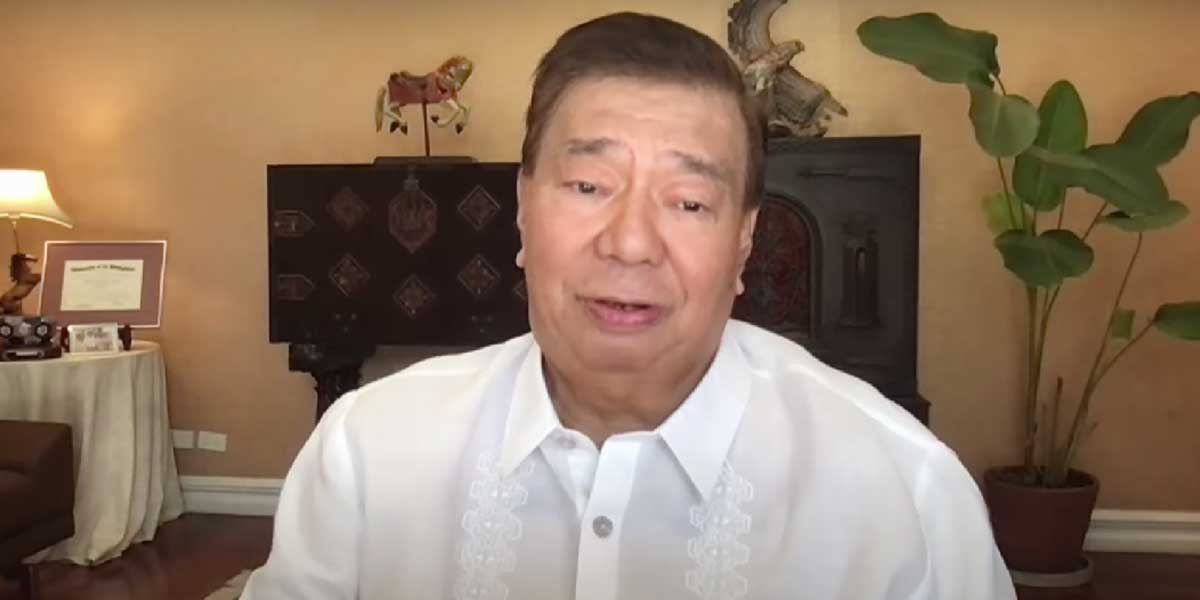
With mounting concerns over the possible misuse of taxpayers’ money, former Ilonggo Senate President Franklin M. Drilon proposed to restrict Confidential and Intelligence Funds (CIF) allocation exclusively to agencies responsible for security and peacekeeping intelligence operations.
“Only those agencies involved in gathering intelligence should be given confidential and intelligence funds. That should be the clear standard,” Drilon said in an interview with ANC’s Headstart on Thursday.
Drilon emphasized that CIFs should only be allocated to organizations, military or civilian such as the National Bureau of Investigation, directly engaged in intelligence gathering for security and peace and order purposes.
He said agencies not directly involved in confidential and intelligence gathering such as the Department of Education should rely on the information provided by intelligence-agencies rather than receiving CIF allocations themselves.
“Agencies like DepEd, DOH, DENR, etc. should draw information from intelligence gathering agencies,” said Drilon, citing the armed forces, the Philippine National Police, NBI, among others.
Drilon’s proposal comes in the wake of growing concerns surrounding the allocation and utilization of CIFs, such as to the Department of Education which is allocated P150 million under the proposed 2024 spending outlay.
Drilon had earlier questioned the decision of the Office of the President to transfer P221.42 million to the OVP, P125 million of which was classified as confidential funds, even though there was no provision for it in the 2022 budget of the OVP.
“The decision raises serious concerns regarding the constitutionality of the fund transfer,” Drilon recently said.
The former justice secretary said he did not agree with the Executive Secretary Lucas Bersamin, a former chief justice, who justified that the release was covered by Special Provision No. 1 under the 2022 Contingent Fund which authorizes the Office of the President to approve funding requirements of new or urgent activities that need to be implemented.
“In the case of Araullo v. Aquino, the Supreme Court ruled that the power to augment cannot be used to fund non-existing items in the budget. This is the interpretation of the Supreme Court. The interpretation of the Constitution cannot be altered or changed by an act of Congress,” Drilon stressed.
Article VI, Section 25 (5) of the Constitution, which states that: “No law shall be passed authorizing any transfer of appropriations; however, the President, the President of the Senate, the Speaker of the House of Representatives, the Chief Justice of the Supreme Court, and the heads of Constitutional Commissions may, by law, be authorized to augment any item in the general appropriations law for their respective offices from savings in other items of their respective appropriations.”
The Office of the Executive Secretary had recently provided a breakdown of the P221.42 million that the Office of the President transferred to the Office of the Vice President in 2022. Of the amount, the OES said that P125 million were confidential funds for “newly created satellite offices.”
The former senator, however, also said that the CIF cannot be used for building satellite offices.
Meanwhile, Drilon advised the Senate to convene more regularly the oversight committee on the use of confidential and intelligence funds to review the utilization of the multi-billion funds.
Drilon also proposed a special provision in the General Appropriations Act that would require the submission of utilization reports to Congress before CIFs can be disbursed to the relevant agencies, thus enhancing oversight and ensuring responsible expenditure of these funds.
Additionally, Drilon suggested inviting the Commission on Audit (COA) to participate in the oversight panel briefings on CIFs.





















